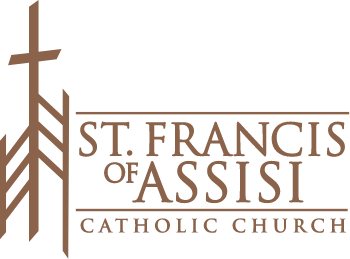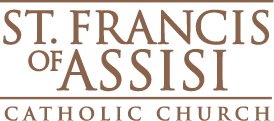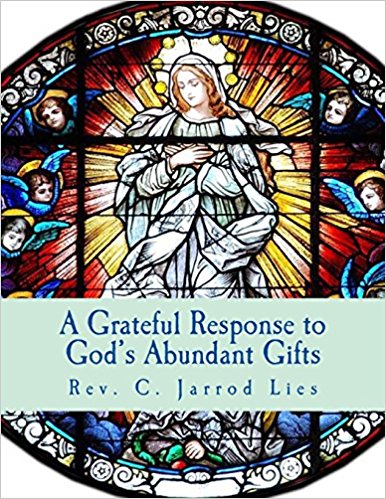Stewardship Bibliography
The stewardship bibliography (document link provided below) is a list of articles, documents, books, videos, and websites that focus on stewardship as practiced at St. Francis of Assisi Parish and in the Diocese of Wichita. It also includes several books and texts that are helpful in implementing stewardship in one’s parish.
Living Life As God Intended
People frequently call St. Francis of Assisi Parish and ask two primary questions, “How do you start stewardship in your parish,” and, “Does it still work.”
Living Life as God Intended (document link provided below), first written in 2003, was written in response to these questions. This 2nd edition, revised in 2018, has kept the same essential content but updating the information and refreshing its wisdom with lessons learned in the 15 years since the 1st edition. In response to the latter question, stewardship does still work as is evidence by 50 years of successful practice in this parish. So long as there is discipleship, there will be stewardship. As for the first question, we hope this document fosters your reflection on this subject and leads you into a creative application of Stewardship in your own parish.
A Brief Introduction…
Msgr. Thomas McGread brought the stewardship way of life to St. Francis of Assisi in 1968. This way of life is captured in the words of St. Peter, “As each one has received a gift use it to serve one another as stewards of God’s various grace.” It was that vision that converted hearts changed lives and brought people closer to God and each other. He carried this message throughout the diocese of Wichita and throughout the United States. Living the stewardship way of life is the path in which one grows in faith and in God’s love. It truly is a way of life. Therefore, stewardship in our parish did not stop when Msgr. McGread retired as pastor in 1999. Stewardship is on-going as parishioners introduce new members to this way of life.
A Grateful Response to God’s Abundant Gifts
To order a copy of Fr. Jarrod’s book “A Grateful Response to God’s Abundant Gifts” from Amazon, click here.
Wichita is the only diocese in the world in which all parishes are operated on the stewardship model and in which all Catholic schools are funded through time, talent, and treasure. Many people look to Wichita to understand stewardship and how to implement it. The book A Grateful Response to God’s Abundant Gifts is a single source summary of all stewardship formation documents in the diocese of Wichita. It elucidates the spirituality of stewardship in its scriptural, magisterial, and pastoral elements as practiced in the Diocese of Wichita. It explores the relationship between discipleship, stewardship, and evangelization. It also explains stewardship in terms of the apostolate, especially the lay apostolate, as taught in the documents of Vatican II. Finally, it outlines the characteristics of a steward, a stewardship parish, and how accountability functions in the relation of the two.
A Brief Introduction…
The Diocese of Wichita defines stewardship as “the grateful response of a Christian disciple who recognizes and receives God’s gifts and shares these gifts in love of God and neighbor.” As one pioneer of stewardship, Msgr. Thomas McGread, stated, “A stewardship way of life is a thanksgiving way of life, living life as God intended it to be lived.” He repeatedly said, “It’s not a program. It’s a way of life. And this is really the biggest mistake many people make.” The mistake referred to is reducing the idea of stewardship to financial development. In the Diocese of Wichita the accent of stewardship is on gratitude for God’s gifts, not on methods of increased financial giving. This accent includes subordinating stewardship to discipleship and making discipleship missionary in practice.
The goal of this book is to summarize and explain the purpose and meaning of stewardship as practiced in the Diocese of Wichita. After an overview of its historical development within the diocese we will proceed through stewardship’s scriptural, magisterial, and pastoral foundations and conclude with the identity and responsibilities of a steward. Although the foundations of stewardship will be explained, a detailed description of the process by which it is implemented within a parish is outside the scope of this paper. A further aim of this paper is to elucidate the intrinsic relationship between stewardship, discipleship, and evangelization. Finally, it is hoped that persons more inclined to see stewardship in terms of finances will come to understand it more in terms akin to the apostolate as set forth in the documents of Vatican II…
Witness of a Lay Steward
Stewardship Presentation at the Parent Walk-Through by Stephanie Farley
Good evening! My name is Stephanie Farley, and my husband, Ryan, and I have four kids. Our twins just graduated from BCCHS this past May, and we have a 3rd and 4th grader here at SFA. I have been an SFA parent for 11 years, and a teacher inside this building for 6 of those years. I also attended school here myself from K-8th, so this building has truly been a home to me for many years.
I want to take this opportunity to talk to you about Stewardship. If you feel like you hear that word all the time, it’s because it really is the center of everything we do here.
The simple definition of Stewardship is “Our Grateful Response to God’s Gifts.” A grateful response. It’s a simple thanks for all the blessings we have already received and continue to receive EVERY DAY! Nothing we have is not a gift. And we can’t say we’re truly grateful if we just give of our leftovers – The leftover money at the end of the month – The leftover hour of time that we didn’t have anything planned for anyway. It has to be a meaningful “thank you.” It comes from making it a priority to show gratitude in the way we live, and as an example to our families.
And I’m VERY grateful.
I’m grateful for the community of people that have been involved in my children’s formation. There isn’t anyone in this building that doesn’t truly want to be here. They love your kids. They want them to succeed – not only at math and reading, but at everything they want to become.
I’m grateful for the opportunities that SFA has over other schools. Even in this diocese – you won’t find a better place with more opportunities than right here. If you are here because you just happen to live in the boundaries, you hit the jackpot. If you have older kids, you will know exactly what I mean. This building is like no other.
I’m grateful for the vast number of volunteers that spend time in this building. If you walk down these halls at any time of day, you will find numerous volunteers working with kids and school programs. Many don’t even have kids in the building – they are here investing in YOUR kids.
I’m grateful that in this world that constantly struggles for moral character; my kids are surrounded by people that give them true examples to follow, and the necessary nudging in the right direction when they falter. This isn’t just a school, or a church, or even just a parish that we are registered in. This is our village, and I have been extremely grateful for this village of people that help me with this ever-more-difficult task of raising these kids.
My adult twins now live the stewardship way of life on their own. They participate in many roles at Mass, parish work days, mission trips, CYM events, and teaching Confirmation. They don’t do this because I tell them to – they are active because it’s their choice to be. This is what they learned from the many great examples from this parish that they witness on a daily basis. There is a feeling of indescribable joy when you see your kids start to take on those habits and choose their own stewardship journey.
So here’s what it takes to make it work. We all need to be on the same boat, moving in the same direction. We don’t all have the same job, since we all have different gifts to offer. Some will plan the course, others prep the supplies. Some are great at getting the team hyped up and ready to go. This boat will be fully stocked, ready to meet everyone’s needs, moving in the right direction. BUT, if we have a bunch of people who are just along for the ride, hanging out, enjoying the fruits of others’ labor without giving of their own, it breaks the entire process down. It only works if everyone does their part.
We all have opportunities to fill that need here at SFA. I used to be able to drive on field trips, help in the classroom and volunteer at every holiday party. But life changes, and now I’m the mom that is willing to send in anything needed, but I can’t be there for every event. Whatever stage of life you are at, there is a place for you here. There are no skill requirements – just a willingness to show gratitude for what you have been given.
In addition to your time and talent, we also need a fair pledge of your tithing. Again – not the leftovers, but a grateful response. All the volunteers in the world won’t help us buy textbooks, update technology, or keep the air conditioning on. Just as there are always things that need attention at your own home, our campus has the same maintenance needs, on a much larger scale.
If you are unaware, the diocese of Wichita is unlike any other diocese in the US in that we receive catholic education completely by tithing. Since I grew up here, I didn’t know that wasn’t the case everywhere. When my twins started kindergarten, we were living in Topeka. A week before school started, I received a bill from the school for $12,000. I called the school assuming it was a mistake since we gave our tithe every month. It was politely explained to me that in Topeka, like most places, the catholic schools were funded by tuition. We scraped by for those early years to make those monthly payments to keep our kids in catholic schools, and were extremely grateful to return to Wichita a few years later.
So parent-to-parent, I ask you to make it a priority to respond with gratitude. Be that example for your kids. Attend Mass as a family regularly. Participate in service opportunities at the parish and school level. And make and keep an honest pledge of treasure.
Parents who are disciples form children who are disciples.
Parents who are good stewards form children who are good stewards.
God Bless.


